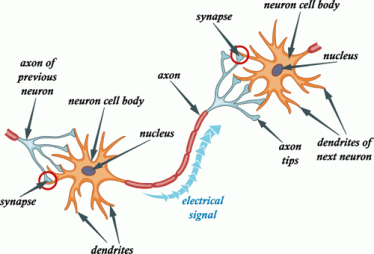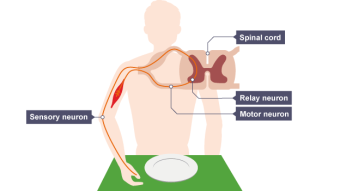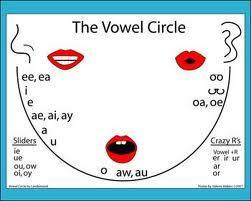By Olivia Bray, 12W
What are mirror neurons?
Mirror neurons are neurons in your brain that fire when you see something happen to someone or when someone performs an action. Mirror neurons are why you flinch when you unexpectedly see someone getting punched, or why your hands may twitch if you see someone grab an object. These neurons make you experience the same sensations as the person who performed the action in the first place, so it’s as if you were punched in the face or grabbed the object.
Mirror neurons were actually discovered accidentally. In the 1990s, Italian researchers hooked macaques up to electrodes so that their brain activity could be monitored. One day, when a researcher reached out to grab some food during his lunch break, he noticed that one of the monkeys was watching him and neurons were activated in his prefrontal cortex, the area of the brain that controls movement. The brain activity was exactly as if the macaque had grabbed the food himself.
This led to further experimentation in 1995, where a study found that when people watched someone grabbing an object, their hand muscles instinctively tensed as if in preparation for grabbing that object themselves, which proved the existence of mirror neurons.
How do mirror neurons work?
To understand how mirror neurons work, we must first understand the general structure of neurons.
There are three main parts of a neuron: the dendrites that detect electrical messages, the axon that messages travel along, and the synapses that let messages be passed on to other neurons.
There are also three different types of neurons. Sensory neurons detect stimuli from outside the body and create messages conveying information from the outside world to the relay neurons that take that information to the brain or spinal cord. Once the nervous system decides on an appropriate response to the stimulus, it sends this response in an electrical message to a motor neuron that can activate the right muscles to respond to the stimulus.
Mirror neurons work in the same way. Sensory neurons in the eyes transmit electrical messages conveying what the eyes are seeing, these messages get sent to the brain, and sometimes they result in motor neuron action (which is why we have reflexes).The memory of that message and the response is imprinted in the brain through neuron action, and the neuron response is replicated whenever someone remembers that stimulus or sees it happening again. The memory pattern is in the same location in the brain as where the neurons would have fired if you’d experienced that action yourself, and the effect is particularly noticeable if the experience you are recalling or seeing is particularly noteworthy or emotionally resonant (such as watching someone hurt themselves).
Why are mirror neurons important?
Doctor V. S. Ramachandran, who was a pioneer in researching mirror neurons, once said that mirror neurons would do for psychology what DNA did for biology. Mirror neurons don’t just allow people’s minds to replicate actions, but also the intentions and emotions behind the actions, which means that mirror neurons have become invaluable in studying human behavior. Without mirror neurons, we wouldn’t have:
Empathy – theory of mind is a knowledge that almost everyone shares: the knowledge that other people have their own thoughts and feelings. This concept develops at around the age of 3 or 4, which is why young children are completely self-centered: they literally can’t understand that other people have minds too. Mirror neurons are essential in developing theory of mind because they allow you to literally feel some of what other people feel, which leads to the understanding that other people experience the same emotions and do similar things for similar reasons to you.
Once theory of mind develops, this can lead to more complex empathy. Sometimes mirror neurons allow you to use empathy on a more tangible level, such as understanding physical pain, and sometimes you can also empathize with mental states, such as happiness.
Socializing – one reason that mirror neurons aid socializing is because of empathy. For example, if you see a friend hunched over in a corner and crying, you’ll be able to work out that they must be sad about something, and then you can start to logically deduce how you should respond to them and what they might be upset about. Once mirror neurons help you understand basic emotions, you can work out how to respond when you see those emotions in other people.
Another reason mirror neurons are helpful is because 60 to 90 percent of our communication is non-verbal. It’s less about words and more about body language, tone of voice and gesture. Watching people’s actions and non-verbal cues causes the same actions to be mimicked in your mind so you can work out the intentions and emotions behind them. This is why if you want to get someone on your good side, you should subtly imitate their body language while talking to them. Their mirror neurons will notice that and realize that you understand what they are talking about.
Language – Mirror neurons are also important in verbal language. Not only are there more mirror neurons in the left hemisphere (the more logical half) of the brain, and in Broca’s area (the part of the brain that controls speech and language), but other people’s vocalizations activate mirror neuron systems. This explains a lot about syntax: why certain sounds in certain letters have specific emotional connotations.
What happens when mirror neurons don’t work properly?
Nowadays, many studies on mirror neurons focus on people who have fewer mirror neurons than they should, or a mirror neuron system that is damaged. Research on the conditions mirror neuron damage causes may lead to better options for therapy and treatment of certain mental disorders in the future, such as:
- Autism – symptoms vary depending on how severe the condition is, but autism often causes language delay, lack of empathy and difficulty in learning social cues,
- Schizophrenia – symptoms vary, but in many cases this disorder causes a breakdown in the understanding and use of language – a 2014 study found that malfunctioning mirror neurons mean that many schizophrenics lose the ability to imitate other people’s actions
- Narcissistic personality disorder – characterized by extreme arrogance and disregard for other people (lacking a theory of mind)
- Psychopathy – many people believe that psychopaths have no capacity for empathy, but a 2013 study on psychopathic criminals found that psychopaths can activate and switch of their mirror neuron systems at will
Bibliography
- Perry, Susan. “Mirror Neurons.” Brain Facts. Society for Neuroscience, 16 Nov. 2008. Web. 19 Dec. 2016.
- Winerman, Lea. “The Mind’s Mirror.” APA. American Psychological Association, Oct. 2005. Web. 19 Dec. 2016.
- NIDA (2007). Bringing the Power of Science to Bear on Drug Abuse and Addiction. Retrieved December 19, 2016, from https://www.drugabuse.gov/publications/teaching-packets/bringing-power-science-to-bear-drug-abuse-addiction
- Clark, Josh. “What Is Theory of Mind?” HowStuffWorks. HowStuffWorks, 05 Apr. 2011. Web. 19 Dec. 2016.
- Marsh, Jason. “Do Mirror Neurons Give Us Empathy?” Greater Good. Berkely University of California, 29 Mar. 2012. Web. 19 Dec. 2016.
- Lehrer, Jonah. “The Mirror Neuron Revolution: Explaining What Makes Humans Social.” Scientific American. Scientific American, 26 June 2008. Web. 19 Dec. 2016.
- Jacobs, Liz. “What Are Mirror Neurons? Further Reading on the Neurotherapy Described in Today’s Talk.” TED Blog. TED Talks, 30 Oct. 2014. Web. 19 Dec. 2016.
- Tarko, Vlad. “How Do Mirror Neurons Work?” Softpedia. Softpedia, 01 Nov. 2006. Web. 19 Dec. 2016.
- Bergland, Christopher. “Do “Mirror Neurons” Help Create Social Understanding?” Psychology Today. Psychology Today, 24 Feb. 2014. Web. 19 Dec. 2016.
- “Autism Linked To Mirror Neuron Dysfunction.” ScienceDaily. University of California, 18 Apr. 2005. Web. 19 Dec. 2016.
- Corballis, Michael C. “Mirror Neurons and the Evolution of Language.” ScienceDirect. Brain And Language, Jan. 2010. Web. 19 Dec. 2016.
- “Neurones.” BBC Bitesize. BBC, n.d. Web. 19 Dec. 2016.
- Hogenboom, Melissa. “Psychopathic Criminals Have Empathy Switch.” BBC News. BBC, 24 July 2013. Web. 19 Dec. 2016.
- Salisbury, David. “Brain Mapping Confirms Patients with Schizophrenia Have Impaired Ability to Imitate.” Vanderbilt News. Vanderbilt University, 14 Mar. 2014. Web. 19 Dec. 2016.
- “Psychopaths, Autism, Empathy and Mirror Neurons.” Kellevision. N.p., 6 Aug. 2015. Web. 19 Dec. 2016.
- Chow, Denise. “Narcissists’ Lack of Empathy Detected in Brain Scans.” LiveScience. Purch, 24 June 2013. Web. 19 Dec. 2016.